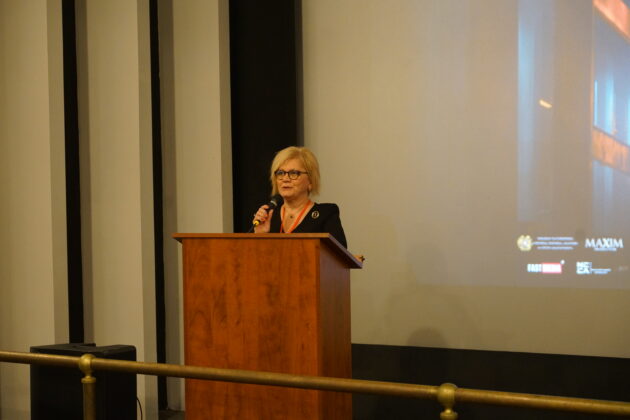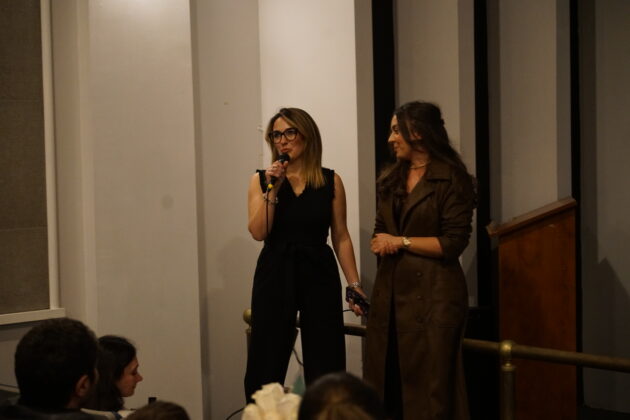Sports
Anna Maxim Discusses Career and Weightlifting Film 'The Reverse Side of the Medal'


The process of writing the script for “The Reverse Side of the Medal” and then filming and editing it took two years, which Maxim said was a very short time considering all that was involved, including covering four seasons, getting the right results from the actors, and filming on a level appropriate for Europe and the rest of the world.
At the February screenings of “The Reverse Side of the Medal” in Arlington, HCA leaders Naira Balagyozian and Raya Gevorgyan welcomed guests and moderated questions to the director from the audience after the presentation.
In the interview, she observed that so far the film has not yet been shown at big European or American film festivals. It is represented by her production company, called Maxim Production, but she said she wished to focus her energy on creating her next film, so she hoped that someone will be found who can be flexible in dealing with this matter. Maxim said that she came to the United States in part to prepare for this new film but is not yet ready to speak about it. After her US trip, she was going to Europe to participate in more screenings of “The Reverse Side of the Medal.”
Nevertheless, she said, “No matter how much you learn, no matter how impressed and inspired you may be, what is most important is that you realize what is in your heart — not try to copy someone else but be able to recognize and learn and then create something that is your own.”

Her first film was called “Taraskhalnerov Karot” [Longing with Misspellings]. It was about a village teacher whose son was in the army. This teacher was so committed to the preservation of the Armenian language that whomever he encountered he would teach Armenian, just like his students, said Maxim. Even when his son wrote letters from the army, he corrected them with red ink and sent them back, not allowing the mother to read them. On the one hand his longing was suffocating. On the other hand, Maxim explained, when a man has principles, he must never betray them.
Hay Cultural Alliance host Naira Balagyozian (photo Aram Arkun)She said in response to an audience question that “The Reverse Side of the Medal” was in Armenia’s 2024 Oscars competition but the 46 members of the Armenian Film Academy chose a different film, which was 70 percent Russian and had little chance to win anything under international conditions then.
The main events of the film are factual, Maxim said, though the order of some were changed. The marriage scene, in which the weight was placed on the barbell just like a ring on the finger of the spouse did not take place in reality, she said, but was a directorial addition to strengthen the meaning of the film.
Maxim said that though there are some extra demands when the director is acting in a scene, it does have the advantage of concrete knowledge of what the director and script demand of you as an actor and may also save time during studio editing. Moreover, she stated: “When I had to undertake this film, I recalled Orson Well’s “The Citizen,” which for me is one of the best international films, where he served as chief actor, director, producer and screen writer. I thought that if it succeeded with him, it could succeed with me too and it seems that it did.”
She had to apply to the National Film Fund of Armenia to obtain financing and found out on January 28 that the application deadline was February 28. She said that she had only done interviews of Avdalyan and others involved in her life so far. She realized she said that in one month she would have to write the script. After listening to 72 hours of interviews, she told herself that she could not leave her room until she wrote it.
As a child, she enjoyed assembling everyone to portray circus acts and receive prizes. She made her own prizes out of whatever toys or statues there were in the house and instructed everyone to give her one. Her sister advised her to apply to the Yerevan State Institute of Theater and Cinematography and, Maxim said, she was only accepted with great difficulty, being practically the last one on the list.
Making ‘The Reverse Side of the Medal’
“Generally, when professionalism comes, the creator becomes less honest,” Maxim said. “As a result of professionalism, he may be able to create good films but that cannot be long lasting if there is not truly that sincerity. For that reason, if you have noticed, the latest films of successful directors are generally very weak because they are more about professionalism. I hope that my love may help me not to lose that.”
Before making “The Reverse Side of the Medal,” Maxim served as co-director of the film “The Armenian” [Hay haye] (2021) with Mikayel (“Michael”) Poghosyan, who also wrote the script and acted in that film.
She said that Armen Mazmanyan, her teacher at the Institute, forbade students to appear in television soap opera serials through the third year of the program, but afterwards she began to work in this arena. She worked ten years as an actress, appearing in a number of serials such as “Generali aghjiku” [The General’s Daughter] (2012-2013) and “Urishi Hogin” [Stranger’s Soul] (162 episodes, 2015-16) as well as in supporting roles in comedy films such as “Chikago Tsaghkdzor Tranzit” (2012) and “Siro gortsakits” (2015) and action films like “Chghjikner: Chezok goti” [Bats: Neutral Zone] (2012) before she stopped and instead went to Moscow in 2017 to learn directing at the S. A. Gerasimov All-Russian State University of Cinematography (VGIK). She felt the institute in Russia was the most serious one in the region, she said, and she had no problem studying in Russian. Maxim noted that she has always loved Russian literature, and never mixes Russian politics with art.
The budget for the filming was not very large, so that Maxim said that a lot of equipment was lacking. She had to film the incident of an automobile accident in Moscow without having basic equipment as a result.
In the after-screening discussion with the audience, Maxim confessed that it was very hard for her as an actress to learn the dialect of Gyumri (Leninakan), as she was always inclined to speak in the Tavush dialect, but in the end she said the people from Leninakan were satisfied.
“‘Aniko,’” said Maxim, “is the story of my childhood, of how I liked literature. Generally, directors wait until the end of their lives to film about their childhood, but I decided to do the opposite.” The main topic of the film is Aniko’s summer vacation in Tavush, in the northeast of Armenia. Maxim’s grandparents grew up in Tavush and though she and her parents were born in Yerevan, and her mother’s side is from Goris in Syunik, Maxim said she considers herself a “Tavushtsi.”
She filmed several short films in this period. The first two were short films, while the third, “Aniko,” was some 50 minutes long and served as her diploma work in Moscow. Maxim said, “In general, if you look at the journey the artist has travelled, short or long, you understand that the person usually speaks about the same thing/topic in different stories.”
She did not act in her first three films. “I had even become cold concerning my specialty, but through this role [of Avdalyan], which returned life to me in the acting world,” she said with a laugh, “I understood that I had learned directing in order to film good films for me in which I can act.”
The second film was about a family whose child had died due to burns experienced during the Trndez festival. That couple could not return to their everyday lives until, as the result of defending the child of a neighbor, they decided to have a child again. That film, Maxim said, was about not losing hope for the continuation of life.
While in Armenian many protest that there is not enough money for making films, Maxim said that an even more important problem is a lack of specialists and experience, so that collaboration and exchange of experience with European or American companies and experts, including those Armenians living abroad, would be very helpful. That is something she would like to do on her next film, she said.
She also read an American book, How to Write a Movie in 21 Days, which evidently helped her succeed in meeting the deadline. Thinking about the stress, she said, “Now, when you remind me, I am just saying the words, but when I remember it, I just want to cry.”
She said she had to film “Aniko” with practically no budget and the assistance of friends, yet it won international prizes, beating out a number of large budget films. And she thinks she knows why: because it was a very honest film.
Sports
Wisconsin volleyball vs Kentucky score today: Final Four live updates
10:35 pm CT
Wisconsin calls last timeout while in 11-7 deficit
John Steppe
Wisconsin has showed some more life lately, but the Badgers still are in a deep hole here. Kentucky has an 11-7 lead. The Wildcats are hitting .500 in the set while the Badgers are hitting .200.
10:31 pm CT
Kentucky goes on 7-1 scoring run as teams switch sides
John Steppe
Wisconsin is in quite the hole here, trailing 8-2 as the teams switch sides halfway through the fifth set. UK has five kills on five total attacks.
10:27 pm CT
Wisconsin falls into 4-1 deficit in fifth set
John Steppe
Kentucky has all the momentum here in the fifth set, jumping to a 4-1 lead with four straight points. Wisconsin has called a timeout. UW has a short runway for another resurgence like what it had in the fourth set against Texas.
10:22 pm CT
Wisconsin vs Kentucky stats comparison through four sets
John Steppe
- Hitting percentage: Wisconsin .382, Kentucky .231
- Kills: Wisconsin 67, Kentucky 54
- Attack errors: Wisconsin 15, Kentucky 20
- Service errors: Kentucky 8, Wisconsin 13
- Blocks: Wisconsin 10, Kentucky 7
10:20 pm CT
Kentucky takes fourth set vs. Wisconsin, 26-24; Final Four match heading to fifth set
John Steppe
This one is heading to five sets.
Kentucky won the fourth, 26-24, with a block by Kassie O’Brien and Kennedy Washington. The Badgers fought off three UK set points before the Wildcats ultimately prevailed.
Mimi Colyer leads Wisconsin with 29 kills. Eva Hudson leads Kentucky with 23 kills. You can see why each of them are finalists for national player of the year.
10:13 pm CT
Wisconsin calls timeout while trailing 23-21 in fourth set
John Steppe
Wisconsin has called its second timeout of the fourth set after Brooklyn DeLeye’s 11th kill pushed Kentucky’s lead to 23-21. For how one-sided the first set was, the sellout crowd at T-Mobile Center has been treated to some high-level volleyball in the three sets since.
10:07 pm CT
Kentucky pushes lead to 20-17 in fourth set, Wisconsin calls timeout
John Steppe
Kentucky has taken three of the last four points. (Two of the points were on Eva Hudson kills.) Wisconsin has called a timeout as the Badgers are in a 20-17 deficit in the fourth set. Hudson is up to 20 kills against the Badgers while hitting .390.
10:00 pm CT
Mimi Colyer’s 26 kills are most by Badger in NCAA tournament match in current scoring era
John Steppe
AVCA national player of the year finalist Mimi Colyer already has 26 kills. That’s the most by a Badger in an NCAA tournament match in the 25-point rally scoring era, which dates back to 2008. With five attack errors, she is hitting .429 against the Wildcats.
Kentucky has a 15-13 lead in the fourth set.
9:58 pm CT
Kentucky takes 13-12 lead in fourth set
John Steppe
Kentucky has won three straight points and taken a 13-12 lead in the fourth set. UW is hitting .312 so far in the set.
9:41 pm CT
Wisconsin finishes third set on 3-0 scoring run, takes 2-1 set lead
John Steppe
Wisconsin ended the third set on a 3-0 scoring run, which started with a successful challenge UW call and another close play that UK opted not to challenge. The Badgers now have a 2-1 set lead going into the fourth set.
Mimi Colyer is up to 22 kills. Carter Booth has 14 kills.
9:39 pm CT
Kentucky calls timeout ahead of Wisconsin’s set point in third set
John Steppe
Wisconsin has a 24-21 lead in the third set after a Lizzie Carr attack error. Craig Skinner contemplated challenging that, but instead opted to take a timeout.
9:33 pm CT
Wisconsin has narrow 21-20 lead in third set
John Steppe
Wisconsin’s once-comfortable lead in the third set feels a little less comfortable. Kentucky has gone on a 3-0 scoring run to shrink UW’s lead to 21-20. UK is hitting .438 in this set and only has one attack error.
9:20 pm CT
Wisconsin goes on 3-0 scoring run, expands lead to 12-7
John Steppe
Wisconsin has gone on a 3-0 scoring run and expanded its lead to 12-7 in what could be a pivotal third set. The Badgers have 11 kills and only one attack error so far in the set.
Mimi Colyer is responsible for seven of those 11 kills. The AVCA national player of the year finalist is up to 17 kills tonight.
9:18 pm CT
Kristen Simon gets attention from athletic trainer, but stays in match after Wisconsin timeout
John Steppe
Wisconsin libero Kristen Simon appeared to be in pain after diving for a ball. Wisconsin called a timeout, and she got attention from the athletic trainer. Kentucky served to her on the next rally, and she had no issues digging it. It eventually led to Mimi Colyer’s 16th kill of the night.
Wisconsin is up, 9-6, in the third set.
9:06 pm CT
Wisconsin vs Kentucky stats comparison through two sets
John Steppe
- Hitting percentage: Wisconsin .404, Kentucky .149
- Kills: Wisconsin 29, Kentucky 22
- Attack errors: Wisconsin 6, Kentucky 12
- Service aces: Wisconsin 0, Kentucky 0
- Service errors: Kentucky 5, Wisconsin 9
- Blocks: Wisconsin 7, Kentucky 3
9:00 pm CT
Kentucky goes on 7-2 scoring run, takes second set vs Wisconsin
John Steppe
Kentucky has evened the match at 1-1, going on a 7-2 scoring run to win the second set 25-22. There were a lot of things that the Badgers may wish they could have back in the second set.
Carter Booth leads Wisconsin with 12 kills while hitting .786. Mimi Colyer has 10 kills while hitting .318.
8:55 pm CT
Kentucky takes 21-20 lead in second set, Wisconsin calls timeout
John Steppe
Kentucky is on a 3-0 scoring run and now has a 21-20 lead in the second set. Wisconsin’s Kelly Sheffield has called his second timeout of the set. The Badgers are hitting .250 in this set. The real culprit has been the six service errors in the set.
8:45 pm CT
Wisconsin, Kentucky go back and forth in second set
John Steppe
Kentucky had a nice 5-2 lead to start the second set, but the Badgers did not take long to claw back and take a 10-9 lead. It’s been back and forth since. There have been seven ties and one lead change in this set after there weren’t any of either in the first set.
Wisconsin is hitting .421 in this set, but the Badgers’ six service errors in this set have been costly.
Score: Wisconsin 15, Kentucky 14 (second set; Wisconsin leads, 1-0)
8:30 pm CT
Wisconsin vs. Kentucky stats comparison after first set
John Steppe
- Hitting percentage: Wisconsin .682, Kentucky .056
- Kills: Wisconsin 15, Kentucky 9
- Attack errors: Kentucky 7, Wisconsin 0
- Digs: Wisconsin 17, Kentucky 5
- Blocks: Wisconsin 3, Kentucky 0
- Side-out percentage: Wisconsin 100%, Kentucky 50%
8:27 pm CT
Wisconsin completely dominates first set, winning 25-12
John Steppe
Wisconsin had an unbelievably good first set, making a Kentucky team that has not lost since mid-September look silly. UW had a .682-.056 advantage in hitting percentage. Mimi Colyer and Carter Booth each had seven kills without any attack errors.
The Badgers sided out 100% of the time in the set.
8:17 pm CT
Wisconsin’s lead is up to 15-6, Kentucky calls another timeout
John Steppe
Wisconsin continues to hit perfectly, with 10 kills on 10 total attacks. Mimi Colyer has five kills, Carter Booth has four and Una Vajagic has one.
Kentucky is totally out of sorts here. Kassie O’Brien essentially had a set that went to nobody, falling to the ground and prompting another UK timeout.
8:09 pm CT
Wisconsin jumps to 8-2 lead, Kentucky calls timeout
John Steppe
Wisconsin has been stellar to start this one. The Badgers have seven kills on seven total attacks and own an early 8-2 lead. (Carter Booth has four of those kills, and Mimi Colyer has the other three.) Kentucky’s Craig Skinner has seen enough and called a timeout. The Wildcats are hitting .333 with two kills on six total attacks.
8:00 pm CT
Wisconsin starters vs. Kentucky in Final Four
John Steppe
- Una Vajagic
- Kristen Simon
- Mimi Colyer
- Alicia Andrew
- Charlie Fuerbringer
- Grace Egan
- Carter Booth
7:48 pm CT
Wisconsin goes with black alternate uniforms again vs. Kentucky
John Steppe
Wisconsin is wearing the same black uniforms that it wore in the previous two rounds. The Badgers are 3-0 this season in these uniforms.
7:35 pm CT
When will Wisconsin-Kentucky match begin?
John Steppe
The official start time for the Wisconsin-Kentucky match will be at 8:03 p.m. CT.
7:24 pm CT
Texas A&M sweeps Pittsburgh in three sets
John Steppe
Texas A&M will await the winner of the Wisconsin-Kentucky match after sweeping Pittsburgh, 29-27, 25-21, 25-20. We’ll see soon whether another No. 3 seed can defeat a No. 1 seed.
Kyndal Stowers led the Aggies with 16 kills while hitting .433. Logan Lednicky had 14 kills.
7:20 pm CT
Pregame reads, video from Journal Sentinel
John Steppe
7:05 pm CT
Pittsburgh-Texas A&M Final Four match is in third set
John Steppe
The Pittsburgh-Texas A&M match is in the third set. The Aggies have a 2-0 set lead, but the Panthers have a 10-9 lead in this set. The Wisconsin-Kentucky match will start 30 minutes after this one ends.
6:55 pm CT
Where did Kentucky rank ahead of NCAA tournament?
John Steppe
- AVCA coaches poll: No. 2
- RPI: No. 3
- KPI: No. 3
6:41 pm CT
Wisconsin vs Kentucky stats comparison
John Steppe
- Hitting percentage: Wisconsin .325, Kentucky .295
- Opponents’ hitting percentage: Kentucky .180, Wisconsin .184
- Kills per set: Wisconsin 15.16, Kentucky 14.95
- Assists per set: Wisconsin 14.26, Kentucky 13.93
- Aces per set: Wisconsin 1.49, Kentucky 1.23
- Blocks per set: Kentucky 2.47, Wisconsin 2.43
6:20 pm CT
What is Wisconsin’s all-time record against Kentucky?
John Steppe
Wisconsin is 4-4 in program history against Kentucky and 2-0 in the Kelly Sheffield era. Here are the previous results:
- Sept. 9, 2022: Three-set win in Lexington
- Sept. 10, 2021: Four-set win in Madison
- Aug. 30, 2008: Three-set win in Lexington
- Sept. 11, 1992: Four-set loss in Madison
- Aug. 31, 1991: Three-set win in Lexington
- Nov. 11, 1988: Three-set loss in Lexington
- Nov. 8, 1986: Three-set loss in Baton Rouge, Louisiana
- Sept. 23, 1978: Two-set loss in Normal, Illinois
6:00 pm CT
Wisconsin volleyball likely starters vs. Kentucky, other key players on roster
John Steppe
The starting lineups won’t be announced until much closer to the start of the match, but these are the most likely starters for the Badgers against Kentucky:
- Outside hitter Una Vajagic
- Outside hitter Mimi Colyer
- Middle blocker Alicia Andrew
- Setter Charlie Fuerbringer
- Right-side hitter Grace Egan
- Middle blocker Carter Booth
- Libero Kristen Simon
The following players came in as reserves in either of the previous two rounds:
- Addy Horner
- Trinity Shadd-Ceres
- Natalie Wardlow
5:58 pm CT
When will Wisconsin-Kentucky Final Four match start?
John Steppe
The Wisconsin-Kentucky national semifinal match will begin roughly 30 minutes after the conclusion of the Texas A&M-Pittsburgh match, which is currently going on.
The NCAA website lists an 8 p.m. estimated start time, but that is just an estimate.
5:30 pm CT
NCAA volleyball Final Four bracket
John Steppe
National semifinals:
- No. 1-seeded Pittsburgh vs. No. 3-seeded Texas A&M (Dec. 18 at 5:30 p.m. CT)
- No. 1-seeded Kentucky vs. No. 3-seeded Wisconsin (Dec. 18, 30 minutes after Pittsburgh-Texas A&M match)
National championship:
- Winner of Pittsburgh-Texas A&M match vs. winner of Kentucky-Wisconsin match (Sunday, Dec. 21, at 2:30 p.m. CT)
5:11 pm CT
How to listen to Wisconsin-Kentucky Final Four match on radio
John Steppe
- 620 WTMJ-AM in Milwaukee, 100.5 WTLX-FM in Madison, 1430 WBEV-AM in Beaver Dam and the Badger Radio Network.
5:10 pm CT
How to watch Wisconsin vs. Kentucky NCAA Final Four match
John Steppe
Sports
Kentucky volleyball live score updates and highlights vs Wisconsin
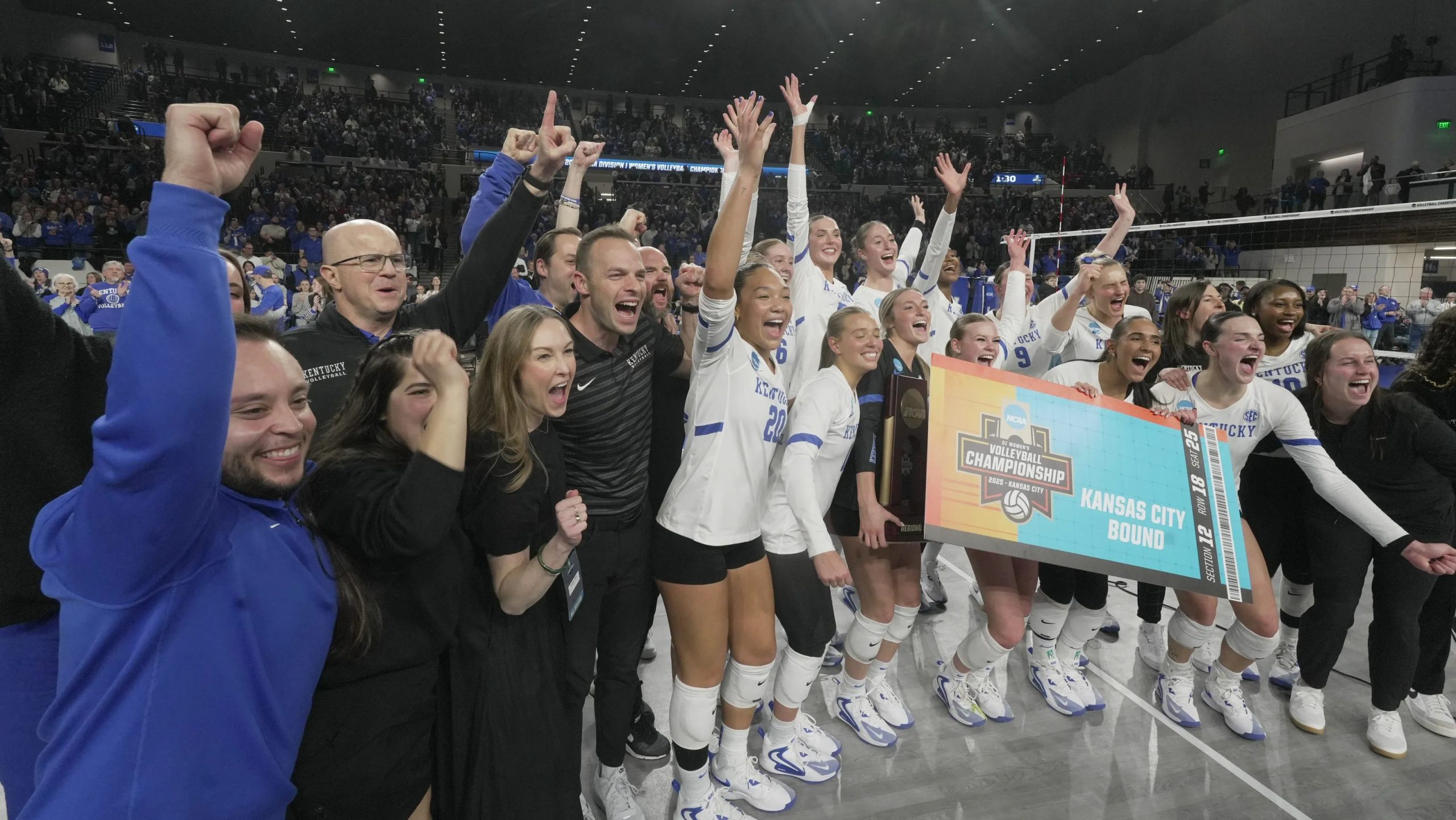
Updated Dec. 18, 2025, 11:20 p.m. ET
The Kentucky Wildcats volleyball team is in the Final Four of the 2025 NCAA Tournament after beating Creighton, and will face the Wisconsin Badgers tonight to move on to the championship match. Coach Craig Skinner’s squad is looking to win it all for the second time in school history.
Brooklyn DeLeye and Eva Hudson are the big hitters on the Wildcats roster, and are the last two SEC Players of the Year. They both have the ability to take over a match, and make life difficult for opposing defenses.
Lizzie Carr has also been terrific so far in this tournament run. She is a great defender, but can also use her 6’6″ frame to get kills from the middle. Kassie O’Brien is the one primarily setting up her teammates, and is one of the best freshmen in the country. Molly Tuozzo, meanwhile, is the heart of the team, and has had some huge digs in the postseason.
Stream Kentucky vs Wisconsin (Free trial available)Players like Kennedy Washington and Asia Thigpen are also important to their success, and will likely get their chance to shine tonight.
It will be a huge match, and one Big Blue Nation will be ready for. Follow along here for live updates and highlights throughout the match.
Kentucky takes set four
The Wildcats and Badgers will go to a deciding set five after the Wildcats take set four 26-24.
Brooklyn DeLeye attack error ties it again
Kentucky had three set points, but couldn’t get it done, and it’s 24-24.
More Kentucky errors
The Wildcats continue to make uncharacteristic errors, and Wisconsin takes advantage. It’s 22-21 Wildcats.
Eva Hudson kill
Hudson gives Kentucky a 19-16 lead in the fourth set.
Wisconsin playing flawlessly
The Badgers are setting up their hitters at a near-perfect rate, and it’s giving them so many easy kills.
Wisconsin’s defense is too good
Another block for the Badgers, their 10th of the match, ties it up at 13 in the fourth set.
Lizzie Carr ties it up
It’s 12-12 after Carr gets a kill.
Kentucky caught sleeping
Wisconsin just tosses it over the net and the Wildcats defenders weren’t ready. It’s 11-9 Badgers.
Brooklyn DeLeye block
After Wisconsin scored four straight, the Wildcats bounce back and tie it at 6.
Wisconsin ties it up
Back to back points for the Badgers makes it 4-4.
Asia Thigpen gets a kill
It’s 4-2 Wildcats after Thigpen gets another nice kill.
Eva Hudson scores first in set four
She gets another kill to open up the must-win set for Kentucky.
Wisconsin wins set three
The Badgers take set three 25-21 and take a 2-1 lead in the match.
Lizzie Carr attack error gives Wisconsin set point
It’s 24-21 after the Carr miss. Kentucky calls a timeout.
A missed Kentucky set results in another point
The Wildcats have struggled all night with sets and another poor set gives a point to the Badgers. It’s 22-20.
Asia Thigpen kill
The Wildcats cut the lead to 20-19 after Thigpen smashes one home. Wisconsin calls timeout.
Kentucky needs a run
They trail 20-17 late in the third set.
Brooklyn DeLeye ends a long rally
Another long rally ends with a DeLeye kill, and it’s 17-15 Wisconsin.
Eva Hudson continues to score points
Hudson is playing well, but errors plague the Wildcats. It’s 15-10 Wisconsin after a Kentucky service error.
Wisconsin pulling ahead
The Badgers have gotten their offense set too easily, and now the Cats trail 12-7 in set three. They call timeout.
Wisconsin defense dominating the match
Another terrific dig by the Badgers and they convert to take a 8-5 lead in the third set.
More Kentucky missed hits
The Wildcats passing hasn’t been good enough so far, and it’s leading to easy points for Wisconsin.
Wisconsin continues to dig out kills
The Badgers are doing a fantastic job at digging out some big kill attempts and turning them into point.
Kennedy Washington gets a kill
It’s 2-2 top open up the third set.
Highlight: Eva Hudson ends set two
Eva Hudson closes out set two
Kentucky takes the second set 25-22 with a strong finish.
Kentucky scores six straight
The Cats led 24-20.
Eva Hudson heating up
Back to back kills by Hudson has the Wildcats up 23-20.
Kentucky evens it up
A Wisconsin kill attempt goes wide and it’s tied at 20 in set two.
Brooklyn DeLeye block
DeLeye gets a big block to make it 18-17 Wisconsin.
Kentucky wins a long rally
It has been a struggle for the Wildcats, but they win a long rally here to get to within a point. Wisconsin calls a timeout.
Wisconsin’s defense is terrific
They get another block, and lead 16-14 now.
The point is reversed
Kentucky loses the point, and Wisconsin leads 15-14.
Kentucky wins a long rally
Kentucky finally gets a block to get the point and take the lead back 15-14.
Kentucky has no answer for Carter Booth
Wisconsin’s offense is a set to Booth on every point, and she’s not missing. She’s hitting over .750 so far.
A fourth service error for the Cats
Serving issues were a problem early in the season, and they have popped back up in this one. It’s 11-10 Badgers.
Wisconsin back to the lead
More Kentucky missed hits have cost them, and the Badgers retake the lead 10-9.
Kentucky has 3rd service error
A service error, then a bad set allows Wisconsin to score back to back points. It’s 8-6 Kentucky.
Eva Hudson gets one down
It’s 5-2 Wildcats after Hudson smashes one through the defense.
Brooklyn DeLeye gets a kill
It’s 2-1 Kentucky to open up set two.
Kentucky errors is set one
Kentucky had 7 attack errors in set one, while Wisconsin had none.
Kentucky dominated in set one
It was, perhaps, the Wildcats’ worst set of the season. Wisconsin recorded a hit percentage of .682 while Kentucky’s was .056. The Badgers win set one 25-12.
Kassie O’Brien struggling so far
O’Brien has been fantastic this season, but she has missed multiple sets so far in this first set.
More errors by Kentucky
A missed set gave Wisconsin one point, then another missed kill attempt gave them another. It’s 15-6 Badgers in set one.
Another service error for Kentucky
That’s two already, and they Wildcats is now 10-3.
Another big defensive play by Wisconsin
It’s now 9-2 Badgers as they are winning in every phase of the match so far.
It’s domination for Wisconsin so far
Kentucky has to call a timeout early. They haven’t been able to set up their offense so far, and they’re missing a lot of their hits. It’s 8-2 Wisconsin.
Kentucky struggling early on
A service error and a missed set have the Wildcats down 6-2 early in set one.
Brooklyn DeLeye gets the Cats on the board
Wisconsin opened up with three straight points before DeLeye got her first kill. It’s 3-1 Badgers.
Kentucky opens with a service error
Molly Tuozzo serves it into the net to start the match, and the Wildcats trail.
Let’s go Kentucky
It’s time. Final Four. Go Cats!
Where to watch Kentucky vs Wisconsin
When to watch Kentucky vs Wisconsin
- Date: Thursday, Dec. 18
- Time: 9:00 P.M. ET
Sports
Toledo Announces Signing of Three Transfers
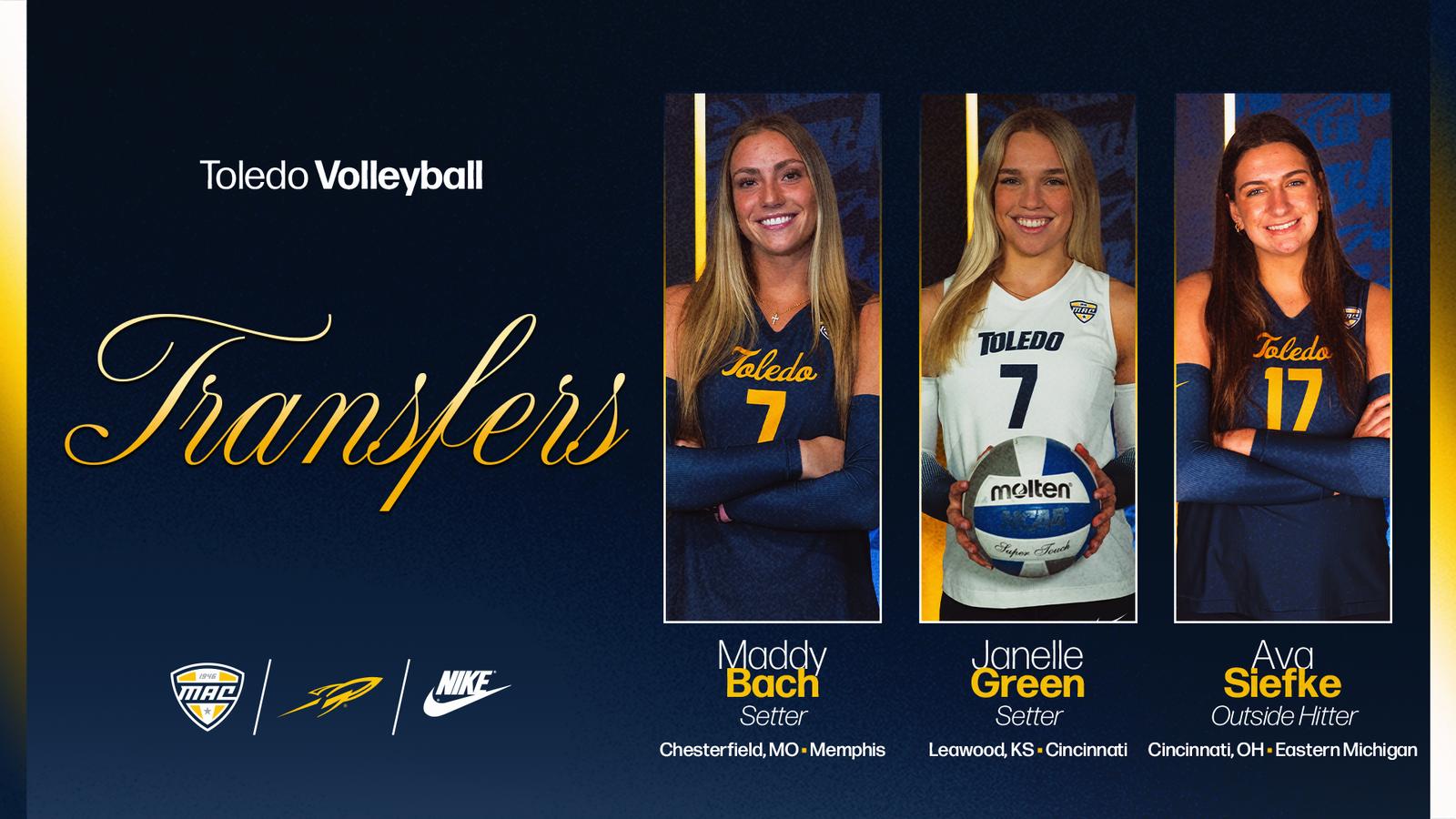
Bach comes to Toledo following a year at Memphis, Green heads to the Glass City from Cincinnati, while Siefke joins the Rockets after spending the past three seasons at Eastern Michigan.
“I’m extremely excited to add these amazing young women to our program,” said Wright. “Each are extremely competitive and highly talented players that will be ready to work hard and be great learners starting in January. Each of them instantly connected with our current team on their visits and fully believe in the program’s goals of striving for championships while giving their best to a team, university and city that supports women’s sports. I am excited for this city to get to know each of them. I’m confident if you get to know them, you will want to support them.”
The following is a look at the three transfer student-athletes:
Maddy Bach | Sophomore | 5-9 | Setter | Chesterfield, Mo. | Parkway West HS | Memphis
Bach appeared in all 31 matches throughout her freshman season at Memphis, totaling 681 assists and dishing out 6.61 assists/set. Bach set a career best with 58 assists against Chattanooga and totaled 164 total digs on the season. In high school, Bach was named a 2024 AVCA All-American Honorable Mention and ACVA All-Region honoree, helped Parkway West to an NSHSAA Class 4 District 2 Championship in 2023 and set the school record for career assists with 2,939. She also won the 2022 GJNC National Championship with USA Volleyball and took second in the 2025 Florida Fest USAV National Qualifier.
Brian Wright on Bach: “Maddy is an extremely hard working and high achieving student-athlete. Her experience setting this past season plus her willingness to train hard this spring makes her future as a Rocket very exciting. I am looking forward to having her in Toledo and seeing her get straight to work with the rest of the team in January.”
Bach on Toledo: “I chose the University of Toledo because as soon as I went on campus it felt like home. I was impressed by the passion of the coaches and players. I love the great culture and strong support from the Toledo community. I am very excited to be part of such a special program.”
Janelle Green | Redshirt Sophomore | 5-10 | Setter | Leawood, Kan. | Blue Valley North HS | Cincinnati
Green saw action in 15 sets across eight matches throughout her time at Cincinnati, totaling 44 assists and 12 digs. Green fired off 12 assists in a win over Texas Tech (11/14/25) and two service aces against Wake Forest (8/29/25). While at Blue Valley North HS, Green was named a 2023 AVCA All-American Honorable Mention and was a three-time All-State Tournament Team and All-Conference First Team selection. She was the No. 1 ranked setter out of Kansas and No. 11 nationally ranked by Prep Dig. Bach won the 2021 6A State Championship and was named a Prep Volleyball 2024 18U Club All-American.
Brian Wright on Green: “Janelle has both a highly competitive drive and desire to connect with others. Her upbringing and determination to be great at everything she does mixed with her ability to build strong connections with her teammates puts her in a spot to have major growth in the gym this spring and also make a big impact on the growth of those around her. I am so excited to get her in the gym and have her get started with the rest of this group in January.”
Green on Toledo: “I chose Toledo because my goals and visions aligned with those of the coaches and the program. The girls on the team were very welcoming, and I felt like it was the perfect fit for me. It’s exciting to see how the city rallies around volleyball, and I can’t wait to see how much more it grows over the next few years. This is a special place, and I am excited to be a part of it!”
Ava Siefke | Senior | 6-1 | Outside Hitter | Cincinnati, Ohio | Saint Ursula Academy | Eastern Michigan
Siefke has appeared in 324 sets across 91 matches at Eastern Michigan, totaling 774 kills, 715 digs, 129 total blocks and 79 service aces. The Cincinnati, Ohio native led the Eagles on offense during the 2025 season and ranked third in the MAC, averaging 3.28 kills/set. Siefke tallied 23 matches with double-figure kills and set a career high with 22 terminations against Bowling Green (10/3/25). She chipped in 2.65 digs/set and led the team with 35 service aces (0.29 aces/set). During her time at Saint Ursula Academy, she was a Girls Greater Catholic League (GGCL) Second Team honoree and earned all-district third team accolades. She was also the runner-up in the 17-American at USA Nationals in 2021.
Brian Wright on Siefke: “From the moment I met Ava, I knew she fit with everything we stand for on and off the court. On the volleyball side, having played the past 3 seasons in the MAC, she brings the experience and leadership of what it takes every single day to be great. Her growth from each season to the next shows that she is a great learner. We are excited to help her continue that growth and have the best possible end to her career.”
Siefke on Toledo: “I really like the culture and how Coach Brian was talking about the program. He has big plans for the program and wants to see his team succeed at the highest level possible. People in Toledo really care about women’s sports and that is something super special about the university.”
Sports
Kentucky volleyball vs. Wisconsin live updates: Score, highlights
Updated Dec. 18, 2025, 10:47 p.m. ET
No. 1 seed Kentucky women’s volleyball will face No. 3 seed Wisconsin in the second national semifinal at the 2025 NCAA volleyball tournament on Thursday at T-Mobile Center in Kansas City, Missouri.
The matchup features two 2025 AVCA Player of the Year finalists. Kentucky outside hitter Eva Hudson is up for the award, after hitting .317 with 4.54 kills per set this season, as is veteran senior outside hitter Mimi Colyer with 20 or more kills in nine matches this season.
Both teams have won a national championship in the past five years. Wisconsin won its first title in program history in 2021, while Kentucky hoisted its only NCAA national championship trophy in 2020.
Follow along as USA TODAY Sports provides live updates and highlights of the Final Four matchup:
NCAA volleyball tournament score: Wisconsin 2, Kentucky 1
3rd set: Wisconsin 25, Kentucky 21
Wisconsin is back on top after winning the first set, 25-21. The Badgers ended the set on a 3-0 run.
The Badgers hit .386 in the third set, compared to .333 for Kentucky. Mimi Coyler leads Wisconsin with 22 kills on .395 hitting, while Carter Booth has tied her career-high with 14 kills and three blocks.
Kentucky’s Eva Hudson has 14 kills on .344 hitting, while Brooklyn Deleye added nine kills on .194 hitting.
2nd set: Kentucky 25, Wisconsin 22
Wisconsin dominated the first set, but Kentucky made some adjustments and came alive in the second set.
Kentucky jumped to a 7-4 lead over Wisconsin in the second, but the gritty Badgers surged mid-set to retake the lead, 20-18. Kentucky went on a 6-0 run to earn a set point, and despite Wisconsin fighting off two set points, Eva Hudson cashed in on the third set point to even it a set apiece.
“We just got some breaks and we executed the serving,” Kentucky head coach Craig Skinner said, adding that his team needs to serve tougher to get Wisconsin off the net. “The serve has got to pick up and our transition game has got to score some points.”
Wisconsin’s Carter Booth recorded 12 kills hitting .786 and Mimi Colyer added 10 kills on .318 hitting.
Kentucky’s Hudson is up to nine kills hitting .389.
1st set final: Wisconsin 25, Kentucky 12
The first set belonged to Wisconsin’s Carter Booth. The senior middle blocker recorded seven kills and two blocks hitting 1.000 in the Badgers’ 22-12 first set win. Mimi Colyer added seven kills.
Wisconsin hit .682 in the first set and held Kentucky to .056 hitting.
1st set: Wisconsin 10, Kentucky 3
Wisconsin came out red hot and jumped to a 10-3 lead after Carter Booth (5) and Mimi Colyer (3) combined for seven kills to start the first set. The Badgers are hitting 1.000 to start.
Carter Booth height
Wisconsin senior middle blocker Carter Booth is listed at 6-foot-7.
When is Kentucky vs. Wisconsin volleyball?
The second semifinal matchup between No. 1 Kentucky (29-2)and Wisconsin (28-4) will take place 30 minutes after the conclusion of the first semifinal between No. 1 Pitt and No. 3 Texas A&M on Thursday, Dec. 18 at the T-Mobile Center in Kansas City, Missouri.
Kentucky vs. Wisconsin volleyball: Channel, streaming
- Date: Thursday, Dec. 18
- Time: 9:00 p.m. ET (8:00 p.m. CT)
- Location: T-Mobile Center (Kansas City, Missouri)
- Channel: ESPN
- Stream: The ESPN App, Fubo
Kentucky Wildcats starting lineup
Head coach: Craig Skinner
- 6 Kassie O’Brien | S 6-1 – Freshman
- 7 Eva Hudson | OH 6-1 – Senior
- 10 Kennedy Washington | MB 6-0 – Sophomore
- 11 Molly Berezowitz | DS 5-5 – Junior
- 12 Molly Tuozzo | L 5-7 – Junior
- 15 Lizzie Carr | MB 6-6 – Redshirt Junior
- 17 Brooklyn DeLeye | OH 6-2 – Junior
Eva Hudson stats
The 6-1 senior outside hitter was named the SEC Player of the Year after hitting .317 with 4.54 kills per set and 504 total kills on the year. She leads Kentucky’s offense, which is hitting .295 this year.
Brooklyn DeLeye stats
The 6-2 junior outside hitter is averaging 4.69 kills per set and hitting .289 with a team-high 521 kills this year. DeLeye is responsible for more than 564.5 points this year.
Kassie O’Brien wins AVCA Freshman of the Year
Kentucky setter Kassie O’Brien was named the 2025 AVCA Freshman of the Year, the first Wildcat to win the award, after averaging 11.02 assists per set this season.
Wisconsin Badgers starting lineup
Head coach: Kelly Sheffield
- 1 Una Vajagic | OH 6-0 – Redshirt Sophomore
- 7 Kristen Simon | L 5-8 – Freshman
- 15 Mimi Colyer | OH 6-3 – Senior
- 17 Alicia Andrew | MB 6-3 – Redshirt Senior
- 24 Charlie Fuerbringer | S 5-11 – Sophomore
- 32 Grace Egan | RS 6-1 – Redshirt Sophomore
- 52 Carter Booth | MB 6-7 – Senior
Mimi Colyer stats
The 6-3 senior outside hitter had 20 or more kills in nine matches this season, including 23 kills vs. No. 1 Texas in the Elite Eight and 27 kills vs. No. 2 Stanford in the Round of 16. She averages 5.39 kills per set.
Wisconsin volleyball arrives at T-Mobile Center
Kentucky volleyball arrives at T-Mobile Center
NCAA volleyball player of the year finalists
The 2025 AVCA Player of the Year shortlist was narrowed to four finalists on Monday: Pitt junior right side hitter Olivia Babcock, Wisconsin senior outside hitter Mimi Colyer, Kentucky senior outside hitter Eva Hudson and Nebraska junior setter Bergen Reilly.
NCAA volleyball transfer portal 2026
The 2025 NCAA women’s college volleyball tournament is down to the Final Four with Kentucky, Pittsburgh, Wisconsin and Texas A&Madvancing to the semifinals, but it’s never too early to look ahead to next season.
As the NCAA crowns a national champion this weekend, some of the biggest names in the sport have entered the transfer portal in search of a new home for the 2026 season. Check out the best players available here.
The USA TODAY app gets you to the heart of the news — fast. Download for award-winning coverage, crosswords, audio storytelling, the eNewspaper and more.
Sports
KWHS senior Emma Hager signs to Black Hills State for volleyball, track and field
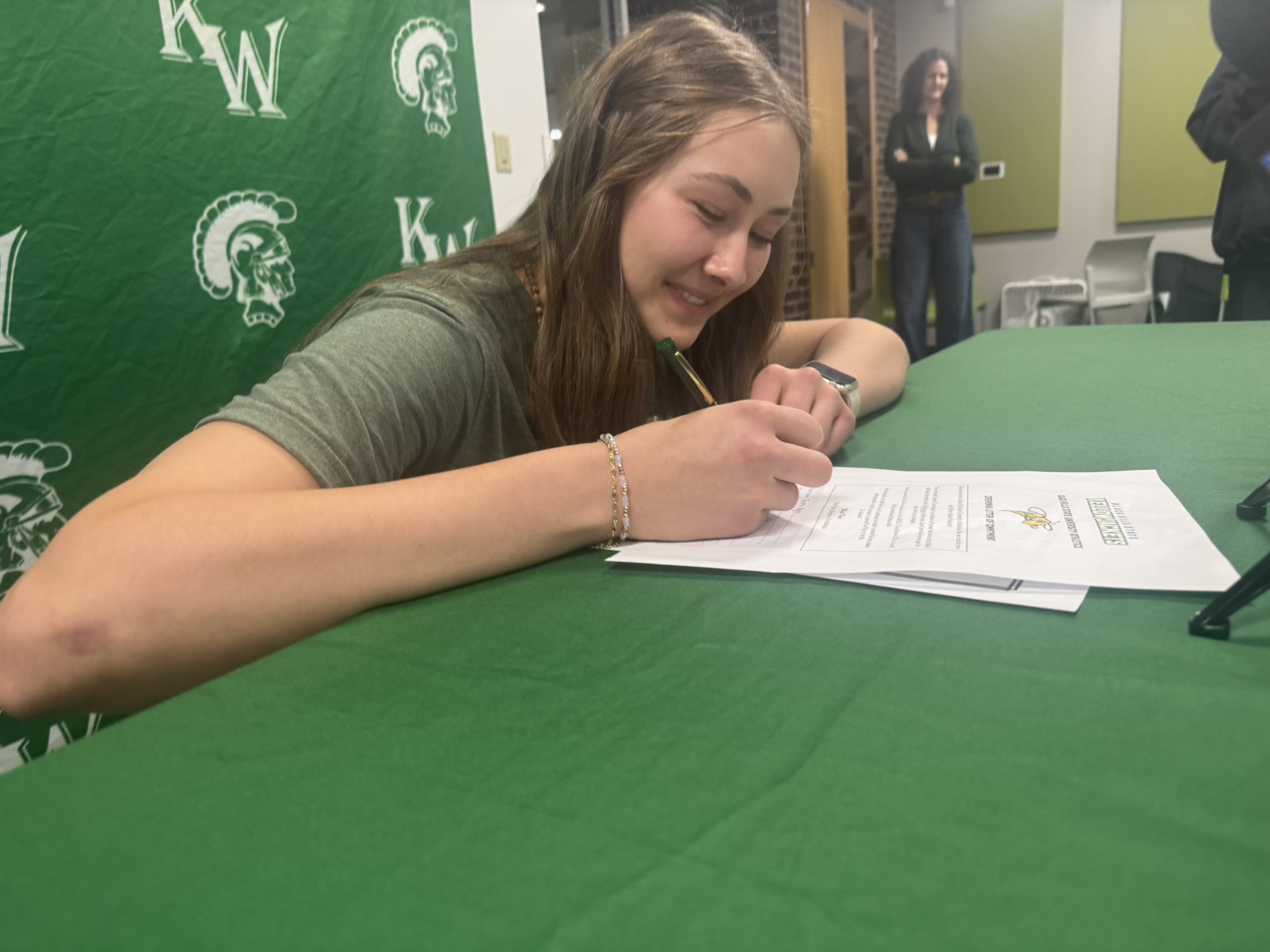
CASPER, Wyo. –– Emma Hager is not a fan of public speaking. The Kelly Walsh High School senior held a ceremony on Wednesday to announce her signing with Black Hills State University, where she will compete in both volleyball and track and field. After signing her ceremonial letter of commitment, Hager took questions from media, and she laughed nervously throughout the entire Q&A session.
Luckily, she was not alone. The room at KW was full of friends, family and fellow athletes — all of whom gathered to show their support for her.

When asked what it meant to her to see such a large crowd, all gathered to support her, she said that “It’s great. It’s kind of scary, but it’s great.” The crowd laughed with her as she spoke about her decision to sign with Black Hills State, what she was most looking forward to in the coming years, and more.
Hager, a 6-foot-0 athlete who will graduate in 2026, is planning to major in Exercise Science at BHS, with the goal of eventually going to graduate school and becoming a physical therapist.
She stated that she was just “looking for something new” with her college decision, which is exactly what she will get at Black Hills State.
She said that it was the coaches at Black Hills State that first drew her interest, and she’s looking forward to being a part of the team as a freshman. She said she met a few of the team’s current players and she felt a good kind of chemistry with them.
Hager, who was there with her entire family, said another big reason why she chose Black Hills State was because it was still within driving distance of her home.

She also spoke about being a dual-athlete at BSU, noting that volleyball was her first love but that she’s just as enthralled with track and field.
“I’ve always loved volleyball,” she said, “ever since I first started playing. And track — I didn’t want to like, give it up after only doing it for a year. I wanted to keep doing both of those.”
So she will. Hager competes in long jump and said that her longest jump was 5 feet, 5 inches. Though track and field is her new passion, volleyball will always hold a special place in her heart. She said that she started playing volleyball in fourth grade and acknowledged that it will always remain her first love.
Hager said her teammates are her favorite part of playing volleyball.
“I really enjoyed playing with them this year,” she said. “I feel like I was able to build some really good relationships with them. I was able to build much closer relationships with the girls on my team than I have in any of the other years. So that was really awesome.”
Many of those friends were at her signing, an, after she signed the letter of commitment, a handful of friends and family members gathered to take pictures with the star athlete.
Hager answered a few more questions, smiling and giggling the whole time. When she was asked what message, if any, she would give to all of her supporters, she took a minute to think and then “phoned a friend.”

“Abby,” she pleaded with one of her nearby friends. “If I could tell everyone one thing, what would it be?”
“What would you tell us?” Abby responded.
“Yeehaw,” Hager said with a smile. “I love you all.”
Photos from the signing ceremony can be seen below:
























Related
Sports
No. 3 Volleyball Earns Spot in National Title Match with Sweep of No. 1 Pitt – Texas A&M Athletics

The Aggies became just the third No. 3 seed in NCAA Tournament history to dispatch of two No. 1 seeds joining UCLA in 2011 and Nebraska in 2021.
A&M will face either Wisconsin or Kentucky in Sunday’s national championship match (2:30 p.m., ABC).
More to come.
-

 Motorsports1 week ago
Motorsports1 week agoSoundGear Named Entitlement Sponsor of Spears CARS Tour Southwest Opener
-

 Motorsports3 weeks ago
Motorsports3 weeks agoJo Shimoda Undergoes Back Surgery
-

 NIL3 weeks ago
NIL3 weeks agoBowl Projections: ESPN predicts 12-team College Football Playoff bracket, full bowl slate after Week 14
-
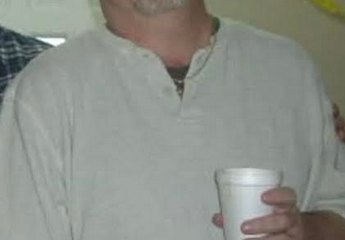
 Rec Sports3 weeks ago
Rec Sports3 weeks agoRobert “Bobby” Lewis Hardin, 56
-
Sports3 weeks ago
Wisconsin volleyball sweeps Minnesota with ease in ranked rivalry win
-

 Motorsports1 week ago
Motorsports1 week agoDonny Schatz finds new home for 2026, inks full-time deal with CJB Motorsports – InForum
-

 Motorsports3 weeks ago
Motorsports3 weeks agoIncreased Purses, 19 Different Tracks Highlight 2026 Great Lakes Super Sprints Schedule – Speedway Digest
-

 Rec Sports2 weeks ago
Rec Sports2 weeks agoHow Donald Trump became FIFA’s ‘soccer president’ long before World Cup draw
-

 Sports2 weeks ago
Sports2 weeks agoMen’s and Women’s Track and Field Release 2026 Indoor Schedule with Opener Slated for December 6 at Home
-

 Motorsports3 weeks ago
Motorsports3 weeks agoMichael Jordan’s fight against NASCAR heads to court, could shake up motorsports

